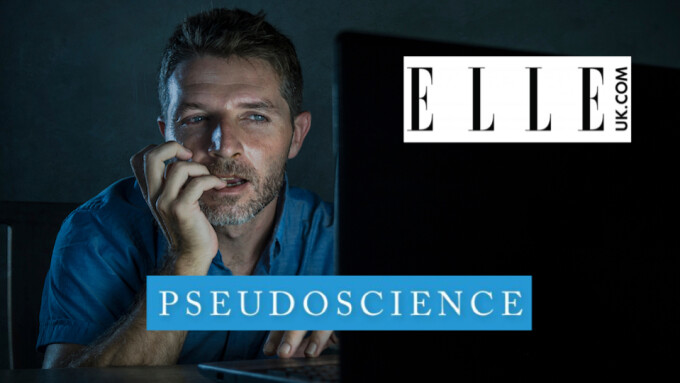LONDON — The British edition of Elle magazine has decided to mark “No Nut November” by publishing a lengthy article fully endorsing the discredited notion of “porn addiction.”
The article, titled “The Partners Of Porn Addicts,” is illustrated with a red-tinted image of handcuffs shackled to a mobile phone. The author, Naomi Larsson, describes herself as an “independent journalist and music maker” and appears to have no qualifications relating to sexual health or psychology.
“I will continue to use the term 'sex addiction,' because that’s how the women I interviewed described the actions of their partners,” Larsson confidently declares in her article, even after pointing out that “both the World Health Organization and the DSM-5 — the American guidebook used by psychiatrists to diagnose mental disorders — claim the clinical components that define an addiction have never been observed in sex. There are no withdrawal effects and there aren't the dangers of overdose that define additions to drugs or alcohol, for example.”
Without any supporting research, Larsson informs her readers, “I later found out that addictions to pornography tend to morph into further sexual exploits. There had been chatrooms, sexting and physical sex with other women.”
The article exclusively considers pornography as something that cis men in heterosexual relationships watch, and which bothers their cis female partners.
“Terminology brings its complications,” Larsson writes, “but ultimately, for the women (and it is mainly women in heterosexual relationships, although I don’t wish to minimize the experience of anyone else) who discover they are in a relationship with someone engaging in this kind of sexual behavior, both the actions and the consequences are painfully real.”
'High-Speed Porn and Supernormal Stimuli'
Larsson's article also foregrounds as factual the controversial notions of U.K. anti-porn therapist Paula Hall. Hall espouses the debunked idea that what she calls “high-speed porn” affects the human brain in a way similar to hard drugs.
“There is a growing body of research demonstrating the powerful affect of high-speed porn on the brain,” Hall writes in one of her many published and recorded tirades against online material involving sexual expression. “Internet pornography is what’s known as a ‘supernormal stimuli’ — in other words, rather than providing the brain with the usual reward that visual sexual stimulation can provide, the endless variety and novelty that can be instantaneously enjoyed is supernormal.”
“This stimuli has been called the ‘crack cocaine’ of sex addiction because it can be so powerfully addictive,” Hall writes. “This means that unlike other forms of sex addiction, which may have roots in childhood trauma, you can become hooked on porn simply because of its easy availability and [a] lack of educational resources about the potential risks.”
Hall, like many other anti-porn activists and members of the “curing porn addiction” cottage industry, disseminates her concepts via TEDx talks, which have a notably lower vetting standard than actual TED talks.
The Elle U.K. article ends by actively promoting Hall’s Laurel Centre, which purports to “cure” supposed “porn addicts,” and by providing a link for troubled partners of cis-het men supposedly suffering from this made-up affliction.







